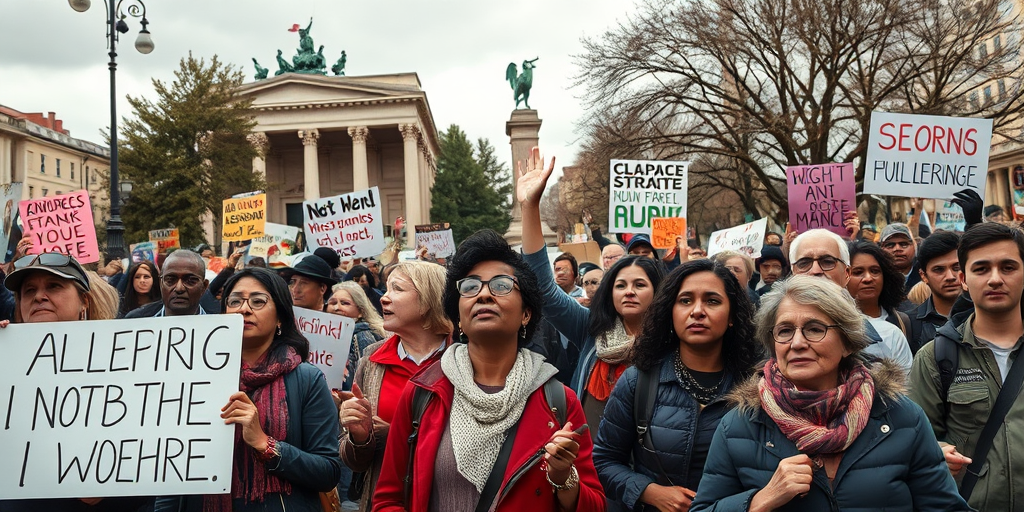Sustainable Switch: White House Targets ‘Climate’ and ‘Diversity’ in Grants for Cancellation
In a controversial decision that has sparked debate across the political spectrum, the White House has announced potential changes to existing grant programs, aiming to eliminate those focused heavily on climate initiatives and diversity efforts. As part of a broader strategy labeled the “Sustainable Switch,” this move targets federal grants perceived as less effective or redundant, raising concerns about the implications for communities reliant on such funding.
A Shift in Federal Funding Priorities
The administration’s Sustainable Switch strategy is reportedly driven by efforts to streamline federal expenditure and redirect funds towards perceived high-priority areas. Officials claim that reviewing and recalibrating the allocation of government grants is essential for ensuring taxpayer dollars are used optimally. However, this shift could significantly alter funding for projects emphasizing climate resilience and diversity enhancement, which have been central themes in government support programs over the past decade.
“We are reassessing funding channels to ensure they align with our current national priorities,” stated White House Budget Director Karen Thompson. “Our objective is not to undermine important causes, but to maximize the impact of federal assistance by focusing on immediate needs.”
Local Impact: Ripple Effects in Communities
For communities across the nation, especially those in regions prone to climate-related challenges, such as the coastal areas and urban centers with diverse populations, the potential cancellation of these grants poses critical risks. Programs combatting climate change and fostering inclusive community initiatives rely heavily on federal support.
In California, where wildfires and droughts have increasingly become the norm, environmental groups express deep concerns about what this shift means for ongoing and future initiatives. Mark Harris, a spokesperson for the California Environmental Federation, remarked, “Canceling climate-focused grants could drastically set back the progress we’ve made in building resilient infrastructures to cope with climate change.”
Meanwhile, organizations focused on fostering diversity and social equity worry about losing the momentum gained in recent years. Angela Brooks, who leads a community outreach project in Atlanta, emphasized, “Federal grants have been pivotal in addressing systemic inequalities. Eliminating these could reverse the advancements made in education and community integration.”
The Larger Context: A Nation Divided
The proposed changes come amidst a highly polarized political environment, where discussions over climate change and diversity often highlight broader ideological divides. Under the previous administration, there was a marked increase in grants targeting these sectors as part of a broader commitment to scientific and social stewardship.
Conversely, the current administration argues for a pragmatic approach, encouraging states and municipalities to shoulder more responsibility for locally addressing these issues through self-funding or private sector partnerships. This philosophy has triggered polarized reactions among state officials and local governments.
Potential Long-Term Implications
If the Sustainable Switch goes into full effect, its long-term implications could significantly alter the landscape of federal support. Experts warn that cutting funding streams may hinder national and global commitments to sustainability and equality.
Economist and policy analyst Dr. Norman Lee pointed out, “Diminished federal support could lead to a slowdown in research and innovation crucial for mitigating climate impacts. Communities with fewer resources might struggle to keep pace, exacerbating existing disparities.”
Moreover, local governments could face heightened pressure to find alternative funding sources, which may not match the scale or consistency of federal grants, possibly leaving existing programs in jeopardy.
Navigating Diverse Perspectives
Stakeholders across the board are now grappling with how best to navigate this shift. While some fiscal conservatives view the reallocation of funds as a necessary step in prioritizing national fiscal health, advocates for climate and diversity programs argue for the indispensable nature of these grants.
Local leaders and community organizers are urging dialogue and collaboration to ensure these policy changes consider a wide array of perspectives and do not disproportionately impact vulnerable communities.
Engaging Community Resources
For concerned residents and organizations, several resources can facilitate engagement and advocacy. Public town halls and forums hosted by both federal and local representatives offer venues for voicing concerns and proposing compromises that maintain critical funding.
Additionally, nonprofit organizations and advocacy groups provide platforms for communal resilience, offering strategies for adapting initiatives in the face of reduced federal support.
Moving forward, the outcome of the Sustainable Switch strategy will depend significantly on continued discourse and the political will to balance fiscal prudence with commitments to sustainability and social equity. The ongoing conversation underscores the need for Woke News and other independent outlets to diligently report on these developments, emphasizing the local impact and fostering informed debate among residents and stakeholders nationwide.







